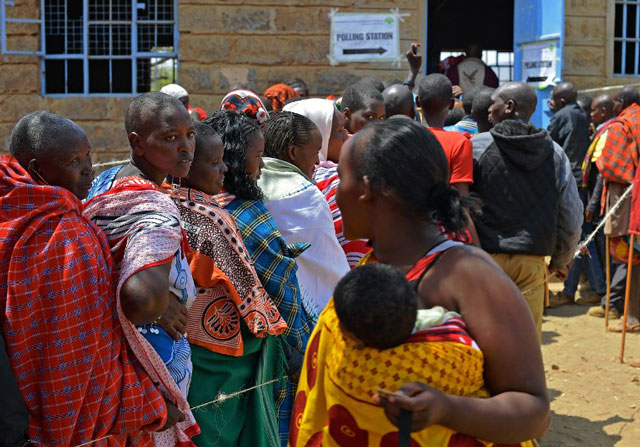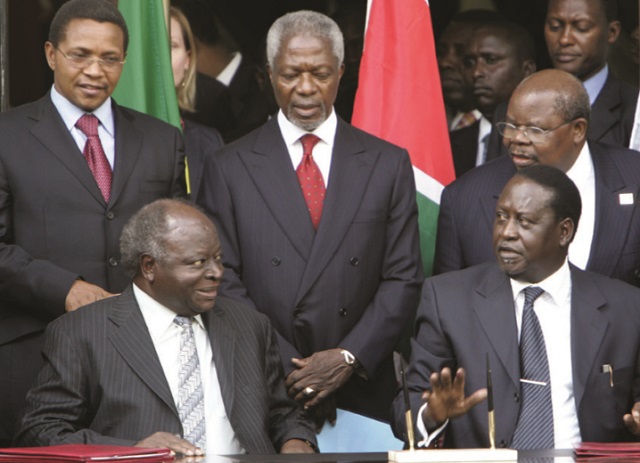
Nairobi, Kenya | AFP | Kenya’s President Uhuru Kenyatta has been declared the winner of the country’s election, but not everybody is happy.
His opponent Raila Odinga insists the election results have been manipulated, and protests have broken out in poor neighbourhoods in two of the country’s major cities.
It’s too soon to say how long, or how significant this unrest will be, but it carries risks for Kenya, a country considered one of the most dynamic and democratic in east Africa.
– How did we get here? –
The disagreement erupted just hours after Tuesday’s vote ended, when Odinga insisted preliminary results being announced by the electoral commission (IEBC) were fraudulent.
Such allegations are not new for Odinga, a veteran opposition leader who has stood for president three times previously.
He placed third in 1997, and in both 2007 and 2013 he cried foul.
The 2007 vote — which international observers said was riddled with irregularities — is notorious as it sparked two months of violence that left 1,100 people dead and 600,000 displaced.
In 2013, he went to court over the elections, and lost.
Despite all that, the 72-year-old is a popular political figure in the country, and his allegations carry weight with his supporters, particularly among his Luo ethnic group who believe they have long been denied political power by Kenyatta’s Kikuyu ethnic group.
– What exactly are Odinga’s complaints? –
Odinga’s National Super Alliance (NASA) coalition claims that hackers breached the IEBC’s electronic voting systems and falsified the results.
Odinga has provided documents allegedly showing a database being manipulated, as well as documents purported to be from the IEBC server showing him to be the true winner.
On Thursday, NASA officials demanded that he be declared president on these grounds.
They also complained they had not seen about 25 percent of the tallying forms meant to back up electronic results streamed directly to the electoral commission’s headquarters.
NASA demanded access to the IEBC’s servers if they were to accept the results of the vote. The coalition has so far ruled out going to court.
The IEBC, for its part, has denied NASA’s claims.

– What’s happening now? –
In most cities in the country, nothing.
But in poor neighbourhoods in Odinga’s western stronghold Kisumu, and in the slums of the capital Nairobi, rioting started immediately after Kenyatta was declared the winner.
Three people have been killed so far in the unrest, including a child shot in the back while watching protests from his balcony in the Nairobi slum Mathare.
Nineteen people were also wounded in that neighbourhood, according to charity Doctors Without Borders.
Businesses believed to belong to Kenyatta supporters were torn down in Kibera, another slum in the capital.
Police have countered the rioters with tear gas, and also live bullets fired into crowds in some instances.
Uncertainty over the election has seen many businesses stay shut, and people remain indoors in the capital since the vote.
– What’s at stake for Kenya? –
Plenty.
The country is one of east Africa’s largest economies and has been growing at a healthy five percent every year since 2013.
The vote dispute threatens that prosperity, and the violence may do even more damage because it calls into question the stability of a country that’s also considered the region’s strongest democracy, said Nic Cheeseman, a professor of African politics at Britain’s University of Birmingham.
“Obviously, everything that happens like that is bad news for the country,” Cheeseman said.
Even without the unrest, things were expected to be tough for Kenya over the next year.
The government may have to cut spending, harming growth, and food prices, which became a campaign issue after they spiked, aren’t likely to come down anytime soon, Cheeseman said.
 The Independent Uganda: You get the Truth we Pay the Price
The Independent Uganda: You get the Truth we Pay the Price




